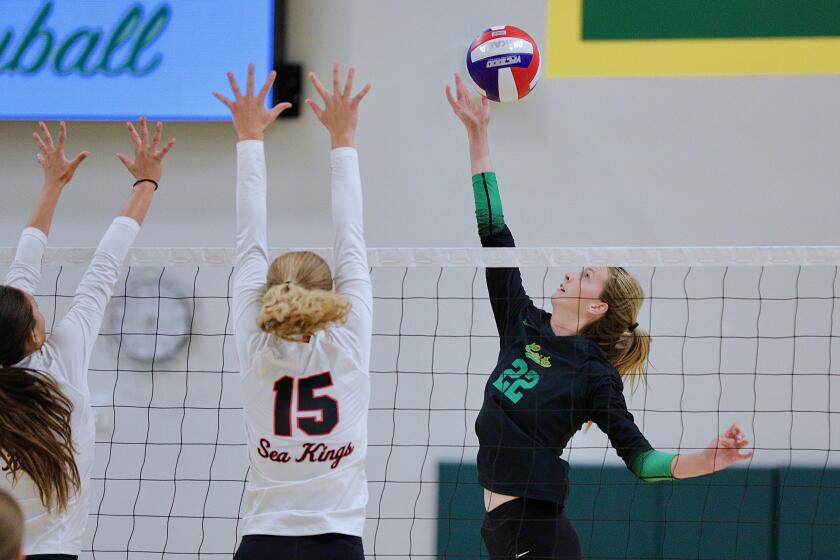A Few Good Women Accept the Challenge of a Male-Dominated Field
As the only female officiating high school football games in Orange County this year, Minochka Taylor often has run into stiff opposition on the field.
“Of course I got flack, always, “ said Taylor, 22, who studied sports medicine and played flag football at Pepperdine University.
Taylor remembers a coach who wanted her to make a call that she felt wasn’t warranted.
“The coach started yelling. He started cussing and acting a fool,” she said. “I think if a man said it was incidental it would have been left at that, but the coach, he handled it very unprofessionally.”
The coach’s lack of respect for authority, a message he passed on to his players, soured her on officiating, Taylor said. Enough so that she is mulling over whether she will return to officiate a second season.
Her absence would further diminish the already tiny contingent of women officiating high school sports in Orange County. Taylor is the only woman among the 214 members of the Orange County Football Officials Assn. Of the 165 officials working high school soccer games in the county, only seven are women. And only 12 women belong to the 260-member Orange County Basketball Officials Assn.
The numbers are just a bit better in volleyball. Only 16 of the 39 Orange County members of the Southern California Volleyball Officials Assn. are women.
The low number of women officiating girls’ basketball puzzles Darlene May, the first woman to officiate women’s international basketball, which she did at the 1984 Olympics.
May participated in several sports in high school and college, and has become the winningest women’s Division II basketball coach in the nation at Cal Poly Pomona. She says there is a natural pool from which to draw female officials--former players.
“The money is there,” May said. “I don’t see any reason why women don’t get involved. I think about all the basketball teams and all the female athletes out there, and I think there is a good pool to choose from and it is a logical pool to go to.”
Sue Lemaire of Walnut, the first woman’s international volleyball official, says former players are not going to be interested in officiating certain sports because of the treatment officials receive from the coaches and spectators.
“Women do not stay in things where they get yelled at and degraded,” Lemaire said. “And isn’t that the role of the spectator right now? It’s everybody against the officials.”
More high school girls participate in basketball than in volleyball, yet volleyball attracts more officials than basketball because of its decorum, Lemaire said.
“I think the rules (in volleyball) still address sportsmanship, and teams and players are penalized for unsportsmanlike conduct.” Lemaire said. “We don’t have to put up with a lot of the garbage. (Officiating volleyball) doesn’t involve any additional physical conditioning like basketball, where you are running up and down the court.”
Dr. Thomas Tutko, a sports psychologist at San Jose State, says societal messages have discouraged women from participating in sports in the past. And those messages are even stronger for officiating.
“Sport, for the most part, is a macho world,” Tutko said. “If you have a woman in charge, and that is what an official is, in charge, that it is very difficult for a male to accept.
” . . . More often than not the desire to officiate grows out of someone having an enjoyable athletic experience, and if women are limited with their experience, that wouldn’t be something that they would want to consider.
“We don’t have women’s football teams, do we? How . . . are you going to be an official in football when we have no women’s football teams? Let’s look at Pop Warner and Little League baseball. We have all kinds of leagues for boys, but it is limited for women. From the very beginning women are limited.”
So limited that they filter themselves out of the officiating pool, Tutko said.
“I think the vast majority of women would somehow feel, just on a personal level, officiating would not be their territory,” he said. “You almost have to buck the system to participate, to play. . . . You’ve really got to love it.”
That is why Timarie Sullivan officiates. Sullivan, the athletic director, basketball and softball coach at Connelly High School in Anaheim, was a three-sport athlete in high school and played community college basketball. She started officiating during college to make extra money.
“As it progressed, I really enjoyed the thrill and the competition,” Sullivan said. “At this point it’s really not for the money because I took a couple of years off and I am now starting back because I really missed it.”
Lisa Ulmer, who played basketball at Cal Poly Pomona and is in her second year officiating, says some women are intimidated by officiating.
“Obviously it is a male-dominated employment and I think a lot of women are intimidated by that,” Ulmer said. “But a woman who is confident in herself and really knows the game will not be intimidated and men will not try to intimidate her.”
Those who officiate, women and men, are not the sort who are intimidated.
“I think it is a special type of person who is willing to be an official,” Tutko said. “I don’t think a weak, subservient or dependent person would want to be an official, male or female. It takes guts to be an official.”
Get our high school sports newsletter
Prep Rally is devoted to the SoCal high school sports experience, bringing you scores, stories and a behind-the-scenes look at what makes prep sports so popular.
You may occasionally receive promotional content from the Los Angeles Times.



